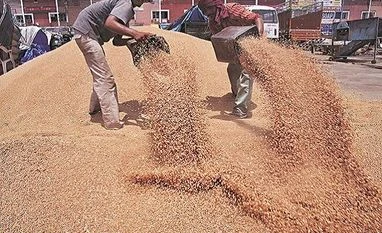Andhra shelves plan to frame law on legalising minimum support price
Fresh Draft may come up after proper consultation, sources said
)
Listen to This Article
In an apparent reversal of its move, the Andhra Pradesh government has decided to shelve its plan of legislation to guarantee minimum support price (MSP) for farmers, which reportedly had clauses that included heavy penalties and jail terms for violators.
The state is expected to come up with a reworked Bill in this regard, top sources said.
The government has decided to shelve the current draft Bill on guaranteeing MSP and rework it, said two sources aware about the development.
Though the officials did not give any reason for shelving the plan, sources said top political authorities in the state were not comfortable with the draft’s content and wanted a second look at it.
The Bill was expected to be introduced in the next session of the Assembly.
Also Read
Earlier this month, reports quoting state Agriculture Minister Kakani Govardhana Reddy had indicated that a judicial review committee was looking at the draft Bill.
According to reports, the Bill was titled “the Andhra Pradesh Farmers’ Produce Support Price Act, 2023”. It defined MSP to be a price set by the state but which would not be lower than the Centre-determined MSP.
It also said the MSP notified under the Act was enforceable for any transactions in the state with regard to farmers’ produce, irrespective of whether this transaction happened within mandis, cooperative societies, or any other collectives.
According to reports, it also provided for a penalty of Rs 50,000 for entering into any transaction below the MSP for the first time. It will go up to Rs 1 lakh and there will be imprisonment for up to six months for subsequent violations.
This Bill and similar bits of legislation have been a contentious issue with stakeholders, and experts have pointed towards the market-distorting nature of such proposals.
A few years ago, in one of its price reports, the Commission for Agriculture Costs and Prices (CACP), the body which sets the MSP for 23 kharif and rabi crops, had suggested bringing in legislation titled “Right to Sell at MSP”, which would give legal backing to the exercise and ensure that no one purchased crops below the fixed mandated price.
The recommendation was never pursued thereafter.
In August 2018, the Maharashtra government under then chief minister Devendra Fadnavis decided to amend the state Agricultural Produce Market Committee Act, making it illegal for a private trader to purchase agricultural produce below the government-fixed MSP.
The amendment said any trader who failed to purchase farm goods at MSP could be sent to jail for a year or be compelled to pay a fine of Rs 50,000.
“The problem with legalising MSP is ensuring that private players follow the guidelines. It can be done wherever government purchases take place. Also such moves are against market-forces,” S Mahendra Dev, former director and vice-chancellor of the Indira Gandhi Institute of Development Research, Mumbai, told Business Standard.
P K Joshi, former director (South-Asia), International Food Policy Research Institute (IFPRI), said problems with legalising MSP started when prices dipped because it was difficult to convince buyers to purchase at predetermined rates, which could be higher.
“To address these problems, the best alternative is the price-deficiency payment system.”
More From This Section
Topics : MSP Andhra Pradesh government Indian Farmers
Don't miss the most important news and views of the day. Get them on our Telegram channel
First Published: Oct 05 2023 | 8:38 PM IST


